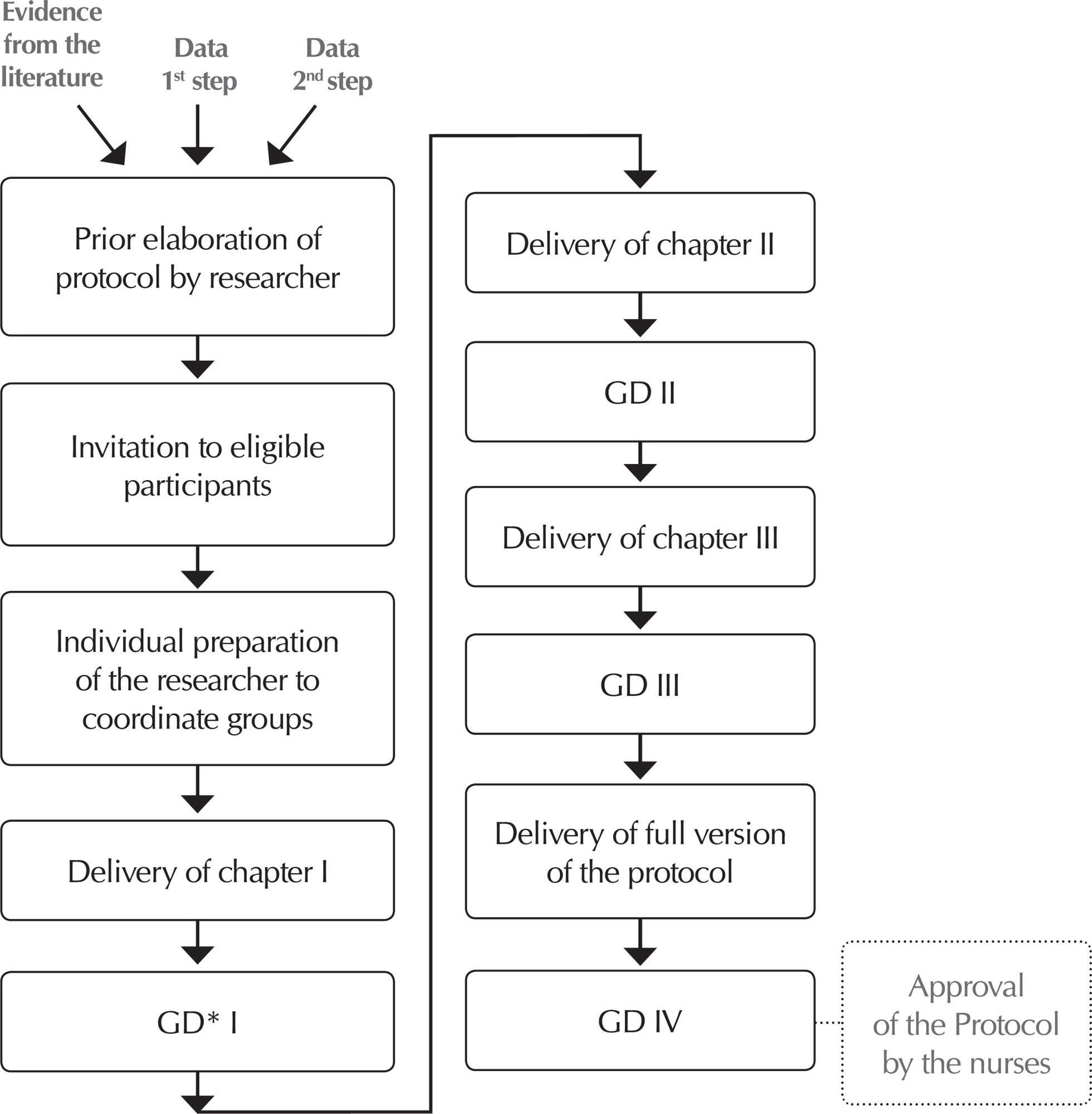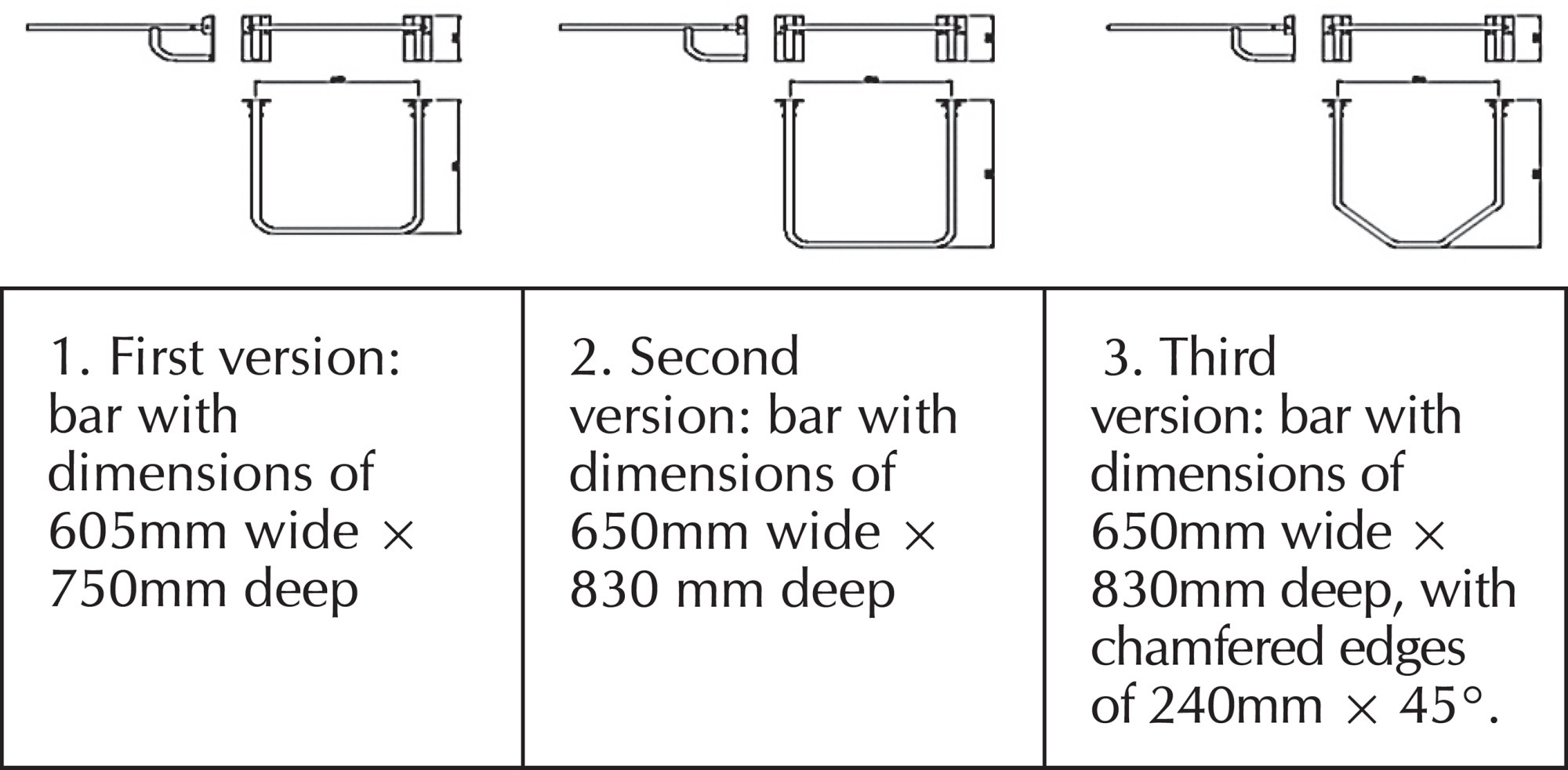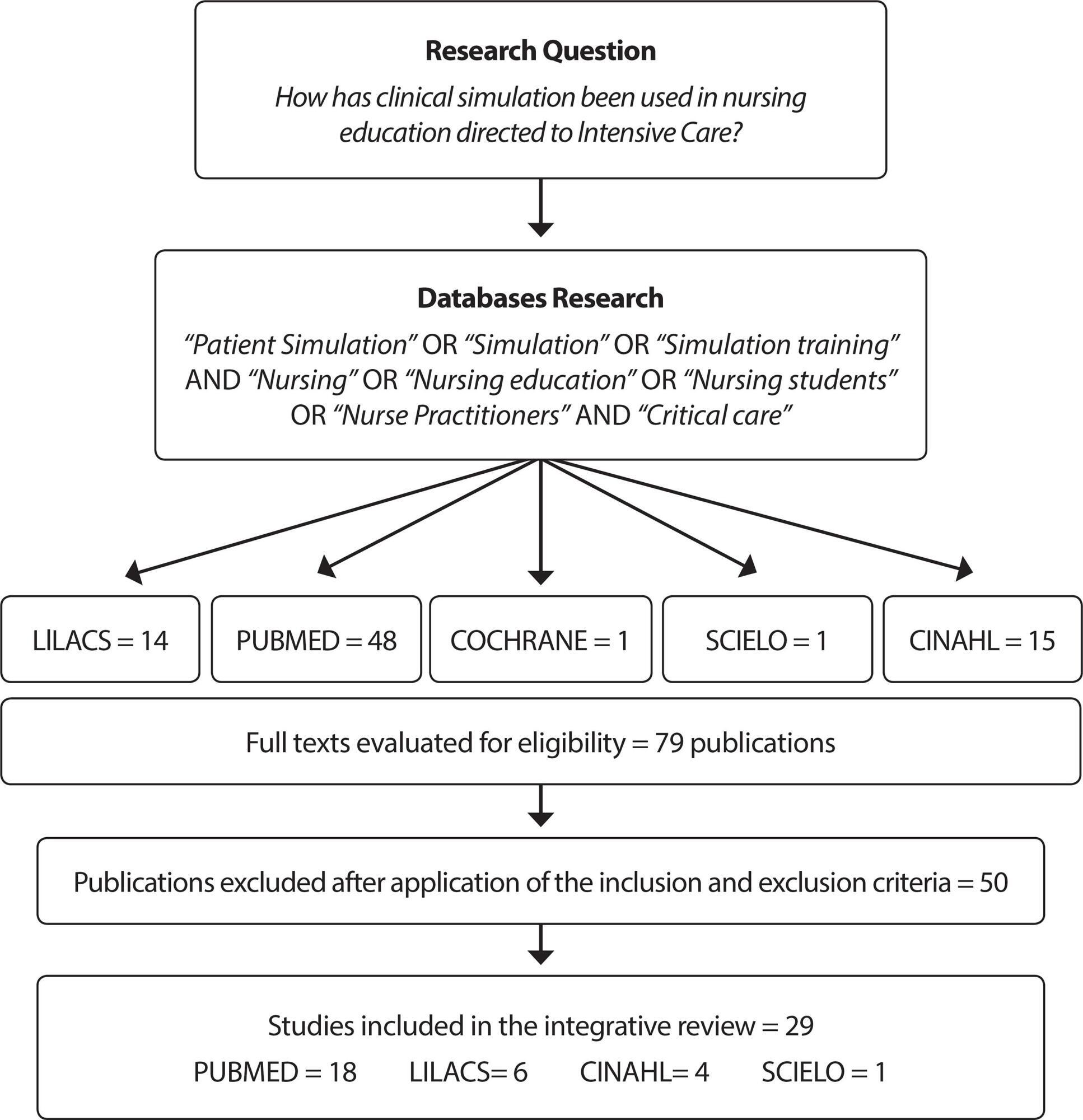-
PESQUISA01/01/2018
Deontological aspects of the nursing profession: understanding the code of ethics
Revista Brasileira de Enfermagem. 2018;71(1):3-10
Resumen
PESQUISADeontological aspects of the nursing profession: understanding the code of ethics
Revista Brasileira de Enfermagem. 2018;71(1):3-10
DOI 10.1590/0034-7167-2016-0565
Visualizações0Ver maisABSTRACT
Objective:
to investigate nursing professionals’ understanding concerning the Code of Ethics; to assess the relevance of the Code of Ethics of the nursing profession and its use in practice; to identify how problem-solving is performed when facing ethical dilemmas in professional practice.
Method:
exploratory descriptive study, conducted with 34 (thirty-four) nursing professionals from a teaching hospital in João Pessoa, PB – Brazil.
Results:
four thematic categories emerged: conception of professional ethics in nursing practice; interpretations of ethics in the practice of care; use of the Code of Ethics in the professional practice; strategies for solving ethical issues in the professional practice.
Final considerations:
some of the nursing professionals comprehend the meaning coherently; others have a limited comprehension, based on jargon. Therefore, a deeper understanding of the text contained in this code is necessary so that it can be applied into practice, aiming to provide a quality care that is, above all, ethical and legal.
-
01/01/2018
Una crisis que no genera cambios no es una crisis en su esencia
Revista Brasileira de Enfermagem. 2018;71(1):1-2
Resumen
Una crisis que no genera cambios no es una crisis en su esencia
Revista Brasileira de Enfermagem. 2018;71(1):1-2
DOI 10.1590/0034-7167.2018710101
Visualizações0LA CRISIS ECONOMICALas dificultades político-económicas que Brasil atraviesa en los últimos tres años, con recortes frecuentes y sistemáticos de recursos en las más diversas áreas, incluyendo educación, salud, ciencia y tecnología, repercuten directamente en la producción científica brasileña. Como parte integrante de este sistema, la producción científica de la enfermería pasa a experimentar una fase […]Ver mais -
01/01/2018
Uma crise que não gera mudanças não é uma crise em sua essência
Revista Brasileira de Enfermagem. 2018;71(1):1-2
Resumen
Uma crise que não gera mudanças não é uma crise em sua essência
Revista Brasileira de Enfermagem. 2018;71(1):1-2
DOI 10.1590/0034-7167.2018710101
Visualizações0A CRISE ECONÔMICAAs dificuldades político-econômicas que o Brasil atravessa nos últimos três anos, com cortes frequentes e sistemáticos de recursos nas mais diversas áreas, incluindo educação, saúde, ciência e tecnologia, repercutem diretamente na produção científica brasileira. Como parte integrante desse sistema, a produção científica da enfermagem passa a experimentar uma fase de declínio quantitativo na […]Ver mais -
REFLEXIÓN01/01/2018
Nursing and light technologies for a peace culture within the family
Revista Brasileira de Enfermagem. 2018;71:2854-2857
Resumen
REFLEXIÓNNursing and light technologies for a peace culture within the family
Revista Brasileira de Enfermagem. 2018;71:2854-2857
DOI 10.1590/0034-7167-2017-0756
Visualizações0Ver maisABSTRACT
Objective:
To reflect on technologies for the peace culture that can be used in family nursing.
Method:
Theoretical essay, based on the premises of non-violence and peace culture.
Results:
Four light technologies are singled out for the peace culture within families: nonviolent communication, qualified listening, conflict mediation, and restorative circles.
Conclusion:
The technologies proposed can be used by nurses to promote care and policies aiming at a peace culture and non-violence in families, with the objective of assisting in the obtainment of the well-being for family systems and their correlations.
-
REFLEXIÓN01/01/2018
The face-to-face encounter in indigenous health care: a perspective in Lévinas
Revista Brasileira de Enfermagem. 2018;71:2848-2853
Resumen
REFLEXIÓNThe face-to-face encounter in indigenous health care: a perspective in Lévinas
Revista Brasileira de Enfermagem. 2018;71:2848-2853
DOI 10.1590/0034-7167-2017-0389
Visualizações0Ver maisABSTRACT
Objective:
To reflect on the sensitive behaviors of indigenous healthcare professionals based on the philosophy of Emmanuel Lévinas, to ratify completeness, equity, and humanity.
Method:
reflective study.
Reflection:
Studies have identified inadequacies in meeting the indigenous singularities. In the hospital and outpatient settings, they are diluted in the search for care. The difficulty of the professionals to admit them generates conflicts and non-adherence of indigenous individuals to treatments that disregard their care practices. In Lévinas, consciousness requires, «a priori,» sensitivity to access the Infinity on the Face of the Other, which in the face-to-face encounters is presented to the Self as radical Alterity, proposing an Ethical relationship through transcendence. The freedom of the Self as to the Other is finite, as the Self cannot possess the Other, and infinite for its responsibility for the Other.
Final considerations:
The Self builds essence and existence in responsibility. In the Ethics of Alterity, in Lévinas, reflections are proposed that influence sensitive behaviors.
-
INFORME DE EXPERIENCIA01/01/2018
Implementation of the Street Outreach Office in the perspective of health care
Revista Brasileira de Enfermagem. 2018;71:2843-2847
Resumen
INFORME DE EXPERIENCIAImplementation of the Street Outreach Office in the perspective of health care
Revista Brasileira de Enfermagem. 2018;71:2843-2847
DOI 10.1590/0034-7167-2017-0616
Visualizações0Ver maisABSTRACT
Objective:
To report the experience of implementation of a clinical equipment of health care production to homeless people, denominated Street Outreach Office.
Method:
Experience report in the city of Rio de Janeiro, Brazil.
Results:
The Street Outreach Office implementation resulted from a demand for health care practices for homeless people. This implementation had intersectoral articulations, causing health professionals to carry out street care practices, which led them to strive for public policies, to rethink their actions in order to increase the resolution of care to this population.
Conclusion:
We should emphasize the importance of health professionals to reinvent their practices, daily, seeking partnerships and acquisition of new knowledge in order to achieve results that can reduce the demands of these individuals throughout their life routes.
-
INFORME DE EXPERIENCIA01/01/2018
Developing a nursing healthcare protocol: a case report
Revista Brasileira de Enfermagem. 2018;71:2837-2842
Resumen
INFORME DE EXPERIENCIADeveloping a nursing healthcare protocol: a case report
Revista Brasileira de Enfermagem. 2018;71:2837-2842
DOI 10.1590/0034-7167-2017-0846
Visualizações0Ver maisABSTRACT
Objective:
to report the use experience of convergent healthcare research for developing a nursing care protocol.
Method:
convergent care research developed in university hospital, from July to December 2016, with 27 participants.
Results:
the stages of the research and its results are described in the steps: conception, instrumentation, screening and analysis. The end result was the nursing care protocol in day zero of hematopoietic stem cell transplantation.
Conclusion:
convergent care research was an appropriate method for developing the care protocol, and an important contribution to the approximation between theory and practice. The nursing care protocol was the result of this study and confirmed both the purpose of the research as a professional Master’s in acquiring knowledge aimed at improving professional practice.

-
INFORME DE EXPERIENCIA01/01/2018
Safe Embrace: technological innovation for elderly safety in the use of toilets
Revista Brasileira de Enfermagem. 2018;71:2833-2836
Resumen
INFORME DE EXPERIENCIASafe Embrace: technological innovation for elderly safety in the use of toilets
Revista Brasileira de Enfermagem. 2018;71:2833-2836
DOI 10.1590/0034-7167-2017-0751
Visualizações0Ver maisABSTRACT
Objective:
to describe the development of a device to prevent falling for seniors when using the toilet.
Method:
we sought in literature and in the hospital market for a device to prevent falling, without success. Geriatric nurses, in partnership with the hospital engineering team, elaborated a prototype and, after several analysis, looked for a partner for its production.
Results:
the device, named «Safe Embrace», installed and tested in an apartment of the Geriatric ward, was positively evaluated by the health team, patients and caregivers.
Conclusion:
for the benefit obtained and considering the safety and privacy during use, Safe Embrace was patented so that other institutions could use it.

-
ARTÍCULO ORIGINAL08/06/2020
Usabilidade de um aplicativo móvel sobre o autocuidado com o pé diabético
Revista Brasileira de Enfermagem. 2020;73(4):e20180862
Resumen
ARTÍCULO ORIGINALUsabilidade de um aplicativo móvel sobre o autocuidado com o pé diabético
Revista Brasileira de Enfermagem. 2020;73(4):e20180862
DOI 10.1590/0034-7167-2018-0862
Visualizações0Ver maisRESUMO
Objetivos:
avaliar a usabilidade pelo usuário final de um protótipo de aplicativo para o autocuidado com o pé diabético.
Métodos:
estudo descritivo, de avaliação heurística da usabilidade de um aplicativo híbrido. Participaram 15 usuários de um serviço ambulatorial de atenção à pessoa com diabetes de uma capital do Nordeste brasileiro durante o mês de abril de 2018. Foi aplicado o instrumento de mensuração de usabilidade chamado Smartphone Usability questionnaiRE.
Resultados:
obteve-se como menor escore 77 e maior 112, com média de usabilidade geral de 96,1 pontos. A usabilidade foi enquadrada nos dois últimos níveis, 70 e 80. Os usuários passam a concordar fortemente (nível 70) e totalmente (nível 80) com os itens avaliados, o que representa boa usabilidade do protótipo de aplicativo.
Conclus
ões: o produto final desenvolvido tem foco nas necessidades e exigências do usuário, o que pode garantir a usabilidade, com base na tríade eficácia, eficiência e satisfação.
-
ARTÍCULO ORIGINAL18/10/2022
Percurso metodológico para alcance do grau de saturação na pesquisa qualitativa: teoria fundamentada
Revista Brasileira de Enfermagem. 2022;75(2):e20201379
Resumen
ARTÍCULO ORIGINALPercurso metodológico para alcance do grau de saturação na pesquisa qualitativa: teoria fundamentada
Revista Brasileira de Enfermagem. 2022;75(2):e20201379
DOI 10.1590/0034-7167-2020-1379
Visualizações0Ver maisRESUMO
Objetivos:
alcançar o grau de saturação em estudo que aplicou a teoria fundamentada.
Métodos:
pesquisa qualitativa, realizada em quatro Unidades Saúde da Família, entre junho de 2018 e maio de 2019. Os dados das entrevistas com 30 profissionais de saúde e observação não participante foram codificados nas etapas: aberta, axial e integração.
Resultados:
o grau de saturação foi alcançado por dois modelos conceituais – saturação teórica e temática indutiva. Foram considerados para a saturação teórica: o desenvolvimento dos códigos conceituais e a observação, na coleta e análise dos dados, quando geravam novas categorias/subcategorias ou apenas indicavam instâncias crescentes. Para a saturação temática indutiva, destacou-se a utilização de novos códigos baseados em cada entrevista.
Considerações Finais:
a esquematização visual para a quantidade de códigos, abrangência teórica dos conceitos e delimitação dos grupos amostrais orientou a identificação do grau de saturação para o desenvolvimento do corpo conceitual que sustentou a teoria substantiva.
-
ARTÍCULO ORIGINAL05/12/2019
Elderly caregivers of the elderly: frailty, loneliness and depressive symptoms
Revista Brasileira de Enfermagem. 2019;72:88-96
Resumen
ARTÍCULO ORIGINALElderly caregivers of the elderly: frailty, loneliness and depressive symptoms
Revista Brasileira de Enfermagem. 2019;72:88-96
DOI 10.1590/0034-7167-2018-0137
Visualizações0Ver maisABSTRACT
Objective:
to investigate the association between frailty, loneliness and depressive symptoms of elderly caregivers.
Method:
a cross – sectional study carried out with 341 elderly caregivers enrolled in Family Health Units of a city in the countryside of São Paulo State. The interviews were domiciliary and included questionnaire for characterization of the caregiver, Fried’s frailty phenotype, family APGAR (family functionality), Geriatric Depression Scale (depressive symptoms) and item 3 of the Herth Hope Scale (loneliness). Logistic regression was used to analyze the association between depressive symptoms and solitude (independent variables), and frailty and pre-frailty (dependent variables).
Results:
there was an association between frailty, loneliness and depressive symptoms. Elderly caregivers had increased odds of 158% presenting pre-frailty, and 360% of frailty. Elderly caregivers with depressive symptoms had an increased chance of 242% of presenting fragility.
Conclusion:
elderly and lonely caregivers with depressive symptoms are more likely to be frail and pre-frail.
-
REFLEXIÓN03/05/2021
A teoria de Florence Nightingale e suas contribuições para o pensamento crítico holístico na enfermagem
Revista Brasileira de Enfermagem. 2021;74(2):e20200139
Resumen
REFLEXIÓNA teoria de Florence Nightingale e suas contribuições para o pensamento crítico holístico na enfermagem
Revista Brasileira de Enfermagem. 2021;74(2):e20200139
DOI 10.1590/0034-7167-2020-0139
Visualizações0RESUMO
Objetivo:
refletir sobre o legado de Florence Nightingale e descrever suas contribuições para o pensamento crítico holístico na enfermagem.
Métodos:
trata-se de uma reflexão teórica, para a qual serviram de base produções científicas sobre a teoria ambientalista de Florence Nightingale, publicadas em periódicos nacionais e internacionais.
Resultados:
a filosofia e os ensinamentos de Florence Nightingale enfatizam que a enfermeira deve usar o cérebro, o coração e as mãos na criação de ambientes de cura, para cuidar do corpo do paciente, de sua mente e de seu espírito. A enfermagem, desde a época de Nightingale, vem construindo o paradigma holístico, em todas as escolas de pensamento, com vistas a uma abordagem humanística do ser humano em sua indivisível relação com o ambiente.
Considerações finais:
as contribuições de Florence ao pensamento crítico holístico na enfermagem são evidentes, constituindo o diferencial do enfermeiro na prática clínica.
Palavras-chave: Cuidados de EnfermagemEnfermagemHistória da EnfermagemPensamento CríticoTeoria de EnfermagemVer mais -
19/08/2019
Clinical simulation in nursing education in intensive therapy: an integrative review
Revista Brasileira de Enfermagem. 2019;72(4):1061-1070
Resumen
Clinical simulation in nursing education in intensive therapy: an integrative review
Revista Brasileira de Enfermagem. 2019;72(4):1061-1070
DOI 10.1590/0034-7167-2018-0217
Visualizações0Ver maisABSTRACT
Objective:
to analyze the publications on clinical simulation practices for education in Nursing in Intensive Care.
Method:
an integrative review carried out through LILACS, PubMed, Cochrane Library, CINAHL and SciELO databases, of articles published from 2008 to 2017.
Results:
29 articles were selected, of which 76% discuss the use of simulation in continuing education of nursing professionals, while the others describe their use for student education. There is a higher prevalence of studies with a level of evidence 6 (17), with 28 international publications. There was an increase in scientific production, with 16 articles published in the last three years.
Conclusion:
variables after simulation use, such as confidence, communication skills, efficiency in the identification of clinical worsening of patients, development of technical skills, teamwork and clinical decision-making, presented a significant improvement, demonstrating that this tool is effective in qualifying care for critical patients.

-
ARTÍCULO DE REVISIÓN26/06/2023
Barriers to Pre-Exposure Prophylaxis (PrEP) use for HIV: an integrative review
Revista Brasileira de Enfermagem. 2023;76(3):e20210963
Resumen
ARTÍCULO DE REVISIÓNBarriers to Pre-Exposure Prophylaxis (PrEP) use for HIV: an integrative review
Revista Brasileira de Enfermagem. 2023;76(3):e20210963
DOI 10.1590/0034-7167-2021-0963
Visualizações0Ver maisABSTRACT
Objectives:
to identify and synthesize scientific evidence on the barriers and difficulties for Pre-exposure Prophylaxis (PrEP) use and compliance for HIV.
Methods:
an integrative literature review, using the MEDLINE/PubMed, Cumulative Index to Nursing and Allied Health Literature (CINAHL), Academic Search Premier and Scopus (Elsevier) databases.
Results:
all (100%) the articles included identified that PrEP users experience some type of structural barrier related to health services such as long distance from the units, suboptimal logistics for taking pills and professional resistance to prescribing PrEP. Furthermore, 63.21% identified social barriers, such as stigma about sexuality and HIV, in addition to individual barriers such as alcohol use, adverse effects, and concerns about long-term toxicity.
Conclusions:
the barriers to PrEP use are multifactorial. Effective interventions are needed to support PrEP users in accessing, complying with, and retaining health services.

-
ARTÍCULO ORIGINAL21/10/2019
Coping religioso/espiritual e a angústia espiritual em pessoas com câncer
Revista Brasileira de Enfermagem. 2019;72(6):1534-1540
Resumen
ARTÍCULO ORIGINALCoping religioso/espiritual e a angústia espiritual em pessoas com câncer
Revista Brasileira de Enfermagem. 2019;72(6):1534-1540
DOI 10.1590/0034-7167-2018-0585
Visualizações1Ver maisRESUMO
Objetivo:
Investigar a relação entre presença de angústia espiritual e uso do coping religioso/espiritual com variáveis sociodemográficas, clínicas e de aspectos religioso/espiritual em pessoas com câncer.
Método:
Estudo transversal, realizado em uma associação de apoio à pessoa com câncer. Os dados obtidos dos instrumentos foram analisados por meio do coeficiente de correlação de Spearman e do teste Mann-Whitney.
Resultados:
Participaram do estudo 129 voluntários; 57% apresentaram moderada angústia espiritual, e 96% faziam uso de médio e alto coping religioso/espiritual positivo. A angústia espiritual apresentou correlação positiva com o coping religioso/espiritual negativo (P < 0,001) e inversa com a idade (p 0,002). O uso do coping religioso positivo foi estatisticamente significativo em pessoas que desenvolvem práticas religiosas (p 0,001).
Conclusão:
A angústia espiritual é um fenômeno presente na vida de pessoas com câncer e tem significativa relação com o uso, de maneira negativa, da religião/espiritualidade como forma de enfrentamento da doença.
-
ARTÍCULO ORIGINAL16/09/2019
Social incentives for adherence to tuberculosis treatment
Revista Brasileira de Enfermagem. 2019;72(5):1182-1188
Resumen
ARTÍCULO ORIGINALSocial incentives for adherence to tuberculosis treatment
Revista Brasileira de Enfermagem. 2019;72(5):1182-1188
DOI 10.1590/0034-7167-2017-0654
Visualizações0Ver maisABSTRACT
Objective:
To analyze the influence of social incentives for adherence to tuberculosis (TB) treatment.
Method:
Qualitative study, in which 26 primary health care professionals of São Paulo were interviewed in 2015.Their testimonies were submitted to the speech analysis technique. The theoretical reference was the social determination of the health-disease process. Ethical procedures were observed.
Results:
TB is related to precarious living conditions. Incentives such as the basic food basket and transportation stipends are relevant for patients’ adherence to treatment, as well as to the create bonds between the patient and the health team.
Final considerations:
The incentives strengthened adherence to TB treatment. However, interventions in the context of public measures must transcend the remedial dimension and be guided towards the transformation of the TB situation, which means supporting processes that modify living conditions.
Búsqueda
Buscar en:
Nuvem de Tags
Adolescente (85) Atenção Primária à Saúde (239) COVID-19 (91) Criança (91) Cuidados de Enfermagem (269) Educação em Enfermagem (151) Educação em Saúde (139) Enfermagem (930) Enfermagem Pediátrica (86) Estudantes de Enfermagem (77) Estudos de Validação (131) Família (87) Idoso (208) Promoção da Saúde (99) Qualidade de Vida (104) Saúde do Trabalhador (86) Saúde Mental (145) Saúde Pública (82) Segurança do Paciente (150) Tecnologia Educacional (100)



